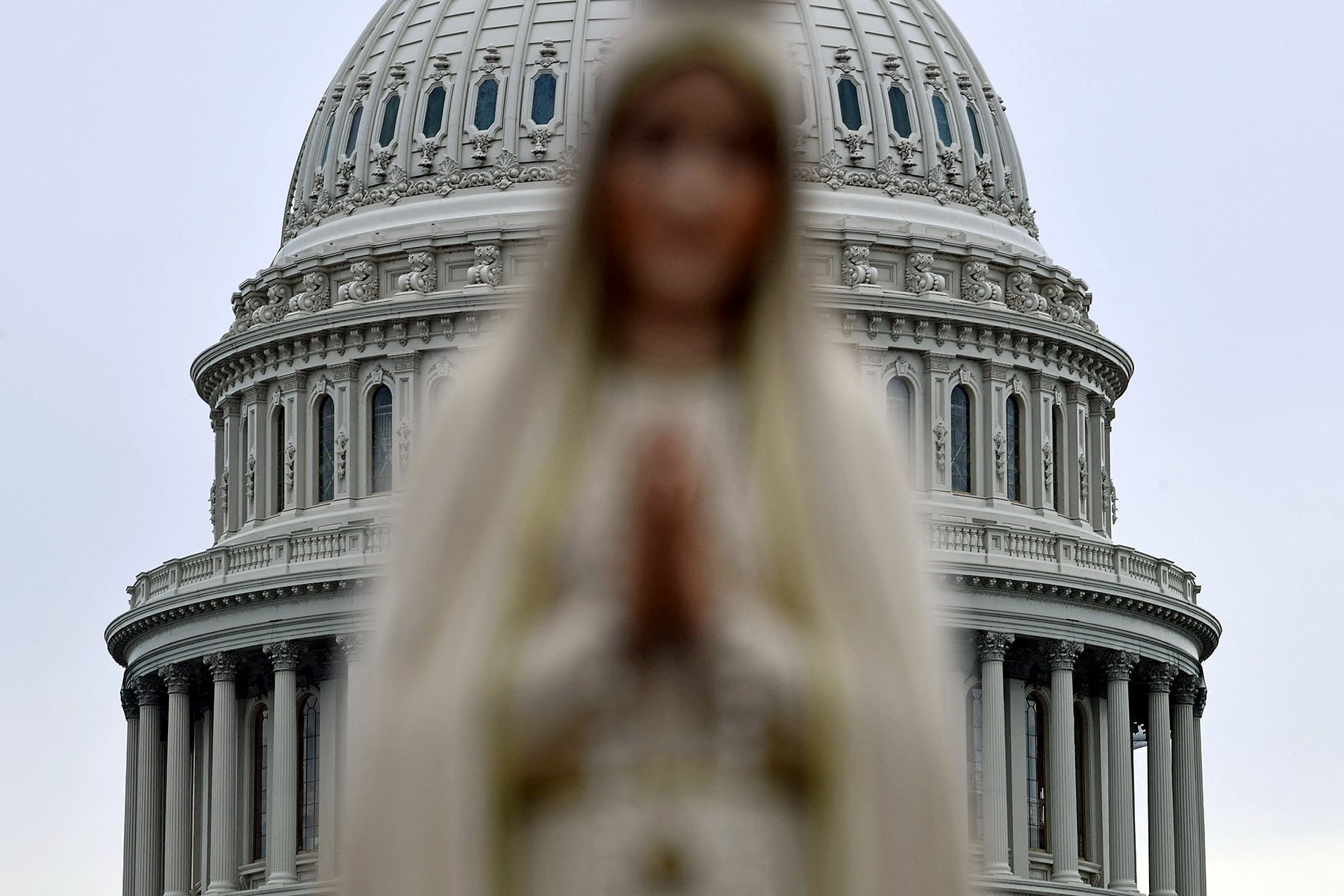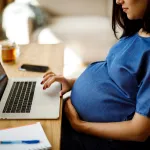Your trusted source for contextualizing the news. Sign up for our daily newsletter.
More than 8,000 Catholic employers across the country will not be required to provide accommodations for workers needing abortion or fertility care following a ruling in North Dakota.
The Pregnant Workers Fairness Act took effect in June 2023, granting workers — many of them low-wage women — protections if they needed time off from work for pregnancy-related conditions. Earlier this year, the Equal Employment Opportunity Commission, which enforces the law, released rules that broadly defined pregnancy-related conditions to include anything from morning sickness to an abortion or fertility care. Under the rules, workers could request time off to get an abortion or for an IVF procedure, for example, and employers must work in good faith to provide the accommodation.
But the Catholic Benefits Association and the Diocese of Bismarck sued the EEOC this summer, arguing that a broad interpretation of the law that included abortion and fertility protections would be violating Catholic employers’ religious freedom.
The EEOC, the complaint said, “hijacked this statute and demanded that Catholic and other employers affirmatively accommodate abortion and immoral fertility treatments.”
The EEOC rules don’t require employers to pay for the care, just to provide time off to allow workers to seek it.
“This rulemaking does not require abortions or affect the availability of abortion; it simply ensures that employees who choose to have (or not to have) an abortion are able to continue participating in the workforce, by seeking reasonable accommodations from covered employers, as needed and absent undue hardship,” the EEOC rules states. The rules also extend to time off for prenatal appointments or accommodations like time to sit, rest, drink, eat or use the bathroom, protections that are not impacted by the injunction.
U.S. District Judge Daniel Traynor sided with the Catholic Benefits Association and the Diocese of Bismarck this week, issuing a preliminary injunction and signaling they were likely to win their case. The injunction bars the EEOC from forcing the association and diocese to accommodate workers seeking abortion or infertility treatment.
It also limits the impact of new harassment guidance from the EEOC. This year, it put out guidance saying that employers who repeatedly call workers by the wrong pronouns or name, or who deny them use of restrooms appropriate with their gender identity could be found to be creating a hostile work environment. The judge ruled that the EEOC cannot take action against the association or the diocese for refusing to use correct pronouns or provide appropriate bathroom access.
An exemption for religious employers in the EEOC rules was not enough, Traynor said, because of lack of clarity around when the exemption would apply because the rule states it will be handled on a case-by-case basis. The judge also rejected the EEOC’s argument that the harassment guidelines were just guidelines and not requirements.
“It is a precarious time for people of religious faith in America. It has been described as a post-Christian age,” wrote Traynor, who was appointed by former President Donald Trump. “The current suit falls into a long line of cases that should be unnecessary in a country that was built on the concept of freedom of religion. Unfortunately, these cases are essential for faithful individuals where government mandates run counter to core religious beliefs.” Traynor previously served as a board member of the North Dakota Catholic Conference, a group that represents the state’s Catholic bishops.
The injunction will impact the 1,380 Catholic employers and 7,100 Catholic parishes — including schools, charities and hospitals — that are a part of the Catholic Benefits Association, a nonprofit that advocates on behalf of Catholic employers. An estimated 162,000 workers are on its member health plans.
The ruling is one of the most significant blows to the protections of the Pregnant Workers Fairness Act. The law was passed with strong bipartisan support in December 2022 after more than a decade of advocacy as advocates saw pregnant workers repeatedly being pushed out of jobs or fired simply for asking for pregnancy accommodations. Most were low-income women of color.
But the abortion provision was the most controversial of the law’s rules when they were announced in April. At the time, EEOC Chair Charlotte Burrows said the rules were designed to “help avoid workers being forced into harrowing situations, jeopardizing their health, their pregnancies and their economic security.” The EEOC argued “pregnancy and related conditions” has long been interpreted by Congress to include abortion.
Gillian Thomas, the senior staff attorney at the American Civil Liberties Union Women’s Rights Project, said in a statement that the ruling “marks a dangerous new low in the weaponization of religion against civil rights.”
“For nearly five decades, abortion has been recognized as part of the full spectrum of workers’ pregnancy-related needs that are protected by the law,” Thomas said, adding: “Today’s ruling turns that history on its head.” She added that “for good measure” the court’s decision could also endanger “the well-being of LGBTQ+ workers, who are facing record high levels of abuse on and off the job.”
Inimai Chettiar, the president of A Better Balance, the organization that led the advocacy effort for the Pregnant Workers Fairness Act, said they’re “working around the clock to defend this law that we fought so hard to pass.”
“The fact that IVF — a highly popular and common medical procedure that millions of Catholics and Christians support — is being targeted speaks to the extremist nature of this case,” Chettiar said. “The decision also contributes to a web of confusing and conflicting patchwork of court rulings around a law that was designed to close gaps in the law and bring clarity to pregnant workers and employers alike.”
This summer, another Trump-appointed judge in Louisiana blocked enforcement of the Pregnant Workers Fairness Act’s abortion protections in Louisiana, Mississippi and among members of the U.S. Conference of Catholic Bishops. Abortion, the judge said, is not a medical condition that employers must accommodate.
But the courts haven’t always landed in the same place. A separate case introduced by 17 Republican-led states regarding the abortion rule was tossed out in June by a judge in Arkansas who said the lawsuit lacked standing because the EEOC would be unlikely to enforce the abortion accommodation requirement against them. That case has since been appealed to the U.S. Court of Appeals for the Eighth Circuit. Another case in Texas barring state employees from having access to any of the law’s protections is also still ongoing.
The case out of North Dakota will almost certainly be appealed by the Biden administration. The Eighth Circuit, which also has jurisdiction over North Dakota, includes four Trump-appointed judges, five judges appointed by former President George. W. Bush, and one each appointed by former Presidents George H.W. Bush and Barack Obama. With potential conflicting rulings on the law, it is possible the issue would go to the U.S. Supreme Court, Chettiar said.
Abortion access, IVF treatment and gender-affirming care have all become major talking points in an election that may be defined by them. Vice President Kamala Harris, who supports all three, has been critical of Trump’s stance on abortion and IVF in particular. Trump initially said he’d vote in support of a ballot measure to add abortion protections to the Florida constitution, before then saying he’d vote against it. And while many anti-abortion advocates have rallied against IVF procedures, Trump has said he’d ensure the government or insurance companies would fully pay for the treatments, without providing details as to how.
“I’m a leader on IVF, which is fertilization, the IVF,” Trump said at the presidential debate earlier this month. “I have been a leader.”





